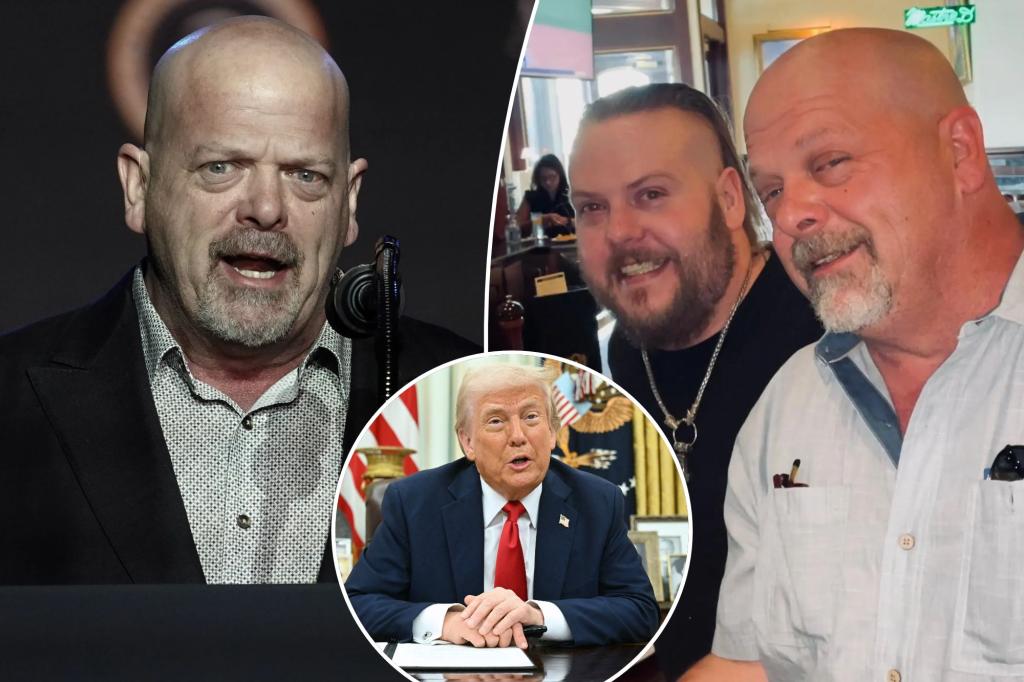Rick Harrison Reflects on Fentanyl Crisis: A Call for Action in the Face of Loss
“Pawn Stars” star Rick Harrison has become an unexpected voice in the fight against the fentanyl epidemic following the tragic death of his son, Adam, from an overdose earlier this year. In a recent interview, Harrison commended former President Donald Trump’s border policies while calling for urgent action to stop the flow of deadly opioids into American communities. His remarks highlight a growing national crisis that claimed over 75,000 lives in the 12-month period ending April 2023, according to CDC data.
The Personal Toll of a National Epidemic
Harrison’s 39-year-old son Adam died in January from fentanyl poisoning, a fate shared by nearly 200 Americans daily. The reality TV personality described his loss with raw emotion: “This isn’t just statistics—it’s poison being sold to our kids while criminals get rich.” His comments reflect a shift in the national conversation, with more families framing overdoses as poisoning rather than addiction.
Forensic pathologist Dr. Jane Whitmer explains: “Today’s street drugs often contain lethal doses of fentanyl without the user’s knowledge. A dose as small as two milligrams—the size of a pencil tip—can be fatal.” The DEA reports that 60% of counterfeit pills tested contain potentially deadly amounts of the synthetic opioid.
Border Security and Policy Debates
Harrison’s praise for Trump’s border wall initiative has reignited discussions about immigration policy’s role in drug trafficking. “We need to secure our borders now,” Harrison stated. “These drugs are coming from somewhere, and we’re not doing enough to stop them.”
However, policy experts offer nuanced perspectives:
- Supply-side approach: Customs and Border Protection seized 27,000 pounds of fentanyl in FY2022, primarily at legal ports of entry
- Demand reduction: Addiction specialists argue for expanded treatment access alongside enforcement
- Pharmaceutical oversight: Some advocate stricter regulation of legal opioid prescriptions
Homeland Security analyst Mark Reynolds notes: “While interdiction matters, fentanyl’s potency makes it exceptionally hard to intercept. A truckload can contain enough to kill millions.”
Communities on the Front Lines
The crisis has transformed how cities respond to overdoses. Las Vegas, where Harrison’s Gold & Silver Pawn Shop operates, has seen:
- A 142% increase in fentanyl-related deaths since 2019
- Wider distribution of naloxone (Narcan) reversal kits
- New “Good Samaritan” laws protecting those who report overdoses
Local outreach worker Maria Gutierrez describes the challenge: “We’re seeing middle-class kids, homeless veterans, and everyone between. This poison doesn’t discriminate.” Her organization now trains school staff to recognize overdose symptoms.
The Path Forward: Prevention and Policy
As Harrison channels grief into advocacy, experts identify multi-pronged solutions:
1. Enhanced screening technology: New scanners at ports can detect fentanyl analogs without opening containers
2. Harm reduction expansion: Supervised consumption sites have reduced deaths in other countries
3. Public awareness campaigns: Targeted messaging about counterfeit pills’ dangers
Senator Amy Klobuchar recently co-sponsored the STOP Fentanyl Act, which would permanently classify fentanyl analogs as Schedule I drugs. Meanwhile, the White House has requested $1.2 billion for addiction treatment programs.
A Father’s Plea for Change
Harrison’s high-profile tragedy has brought renewed attention to what the NIH calls “the worst drug crisis in American history.” His call to action resonates beyond political lines: “If we don’t fix this, more families will get that terrible knock on the door. I wouldn’t wish this pain on anyone.”
For readers seeking to help, the CDC’s Overdose Prevention Resource Center offers training materials and crisis response guides. As this epidemic evolves, Harrison’s loss reminds us that behind every statistic lies a human story—and a urgent need for solutions.
See more WebMD Network



